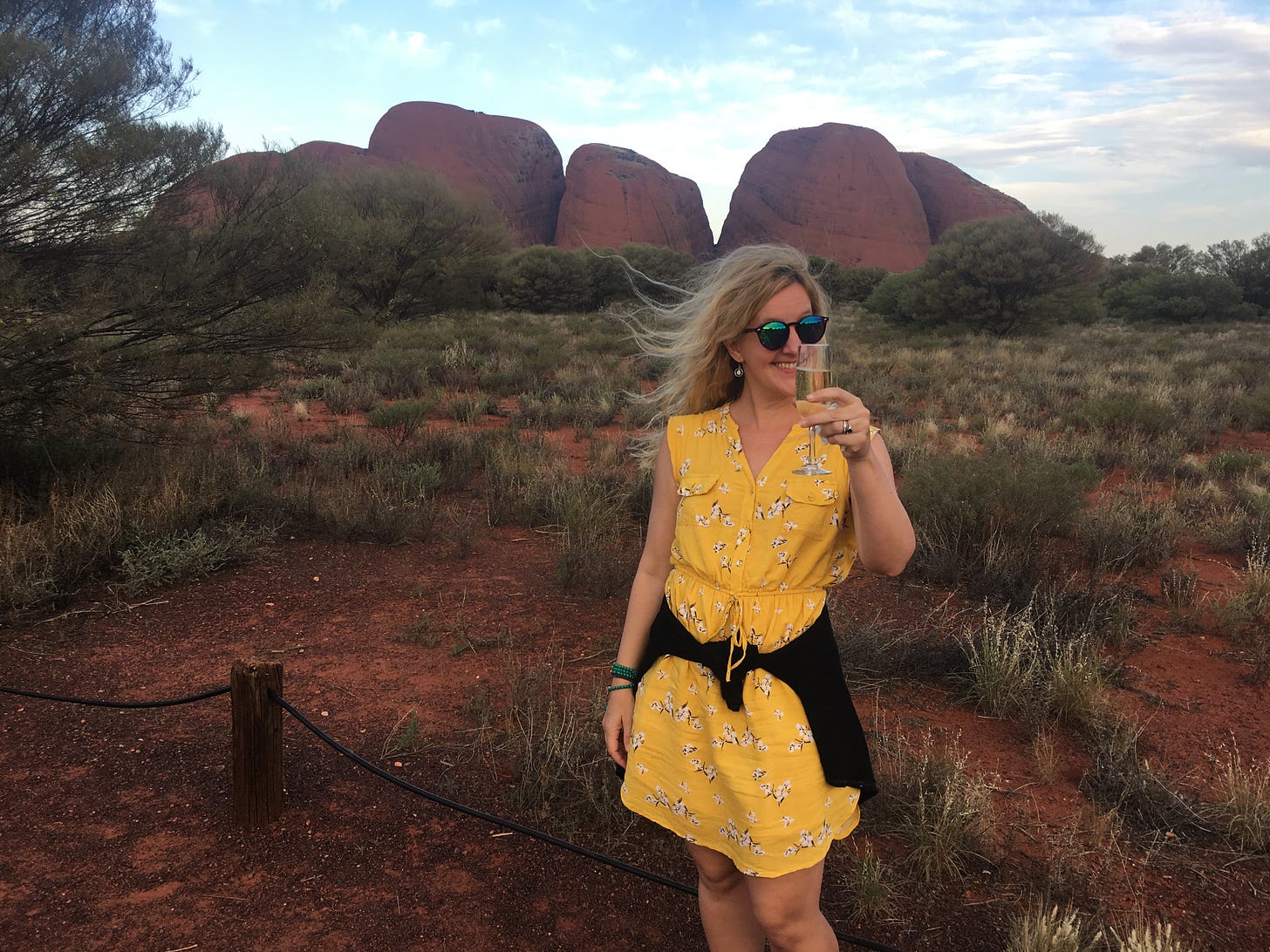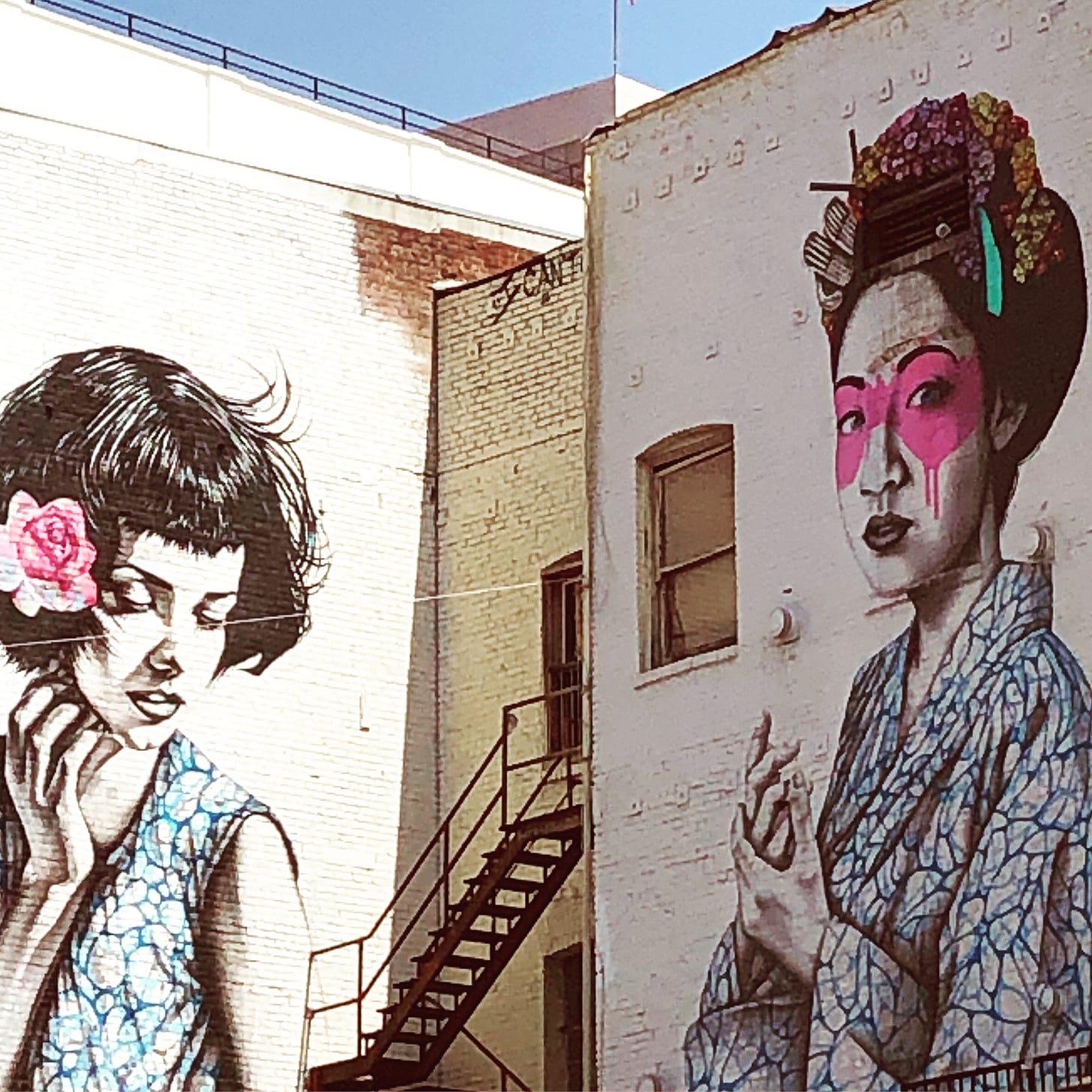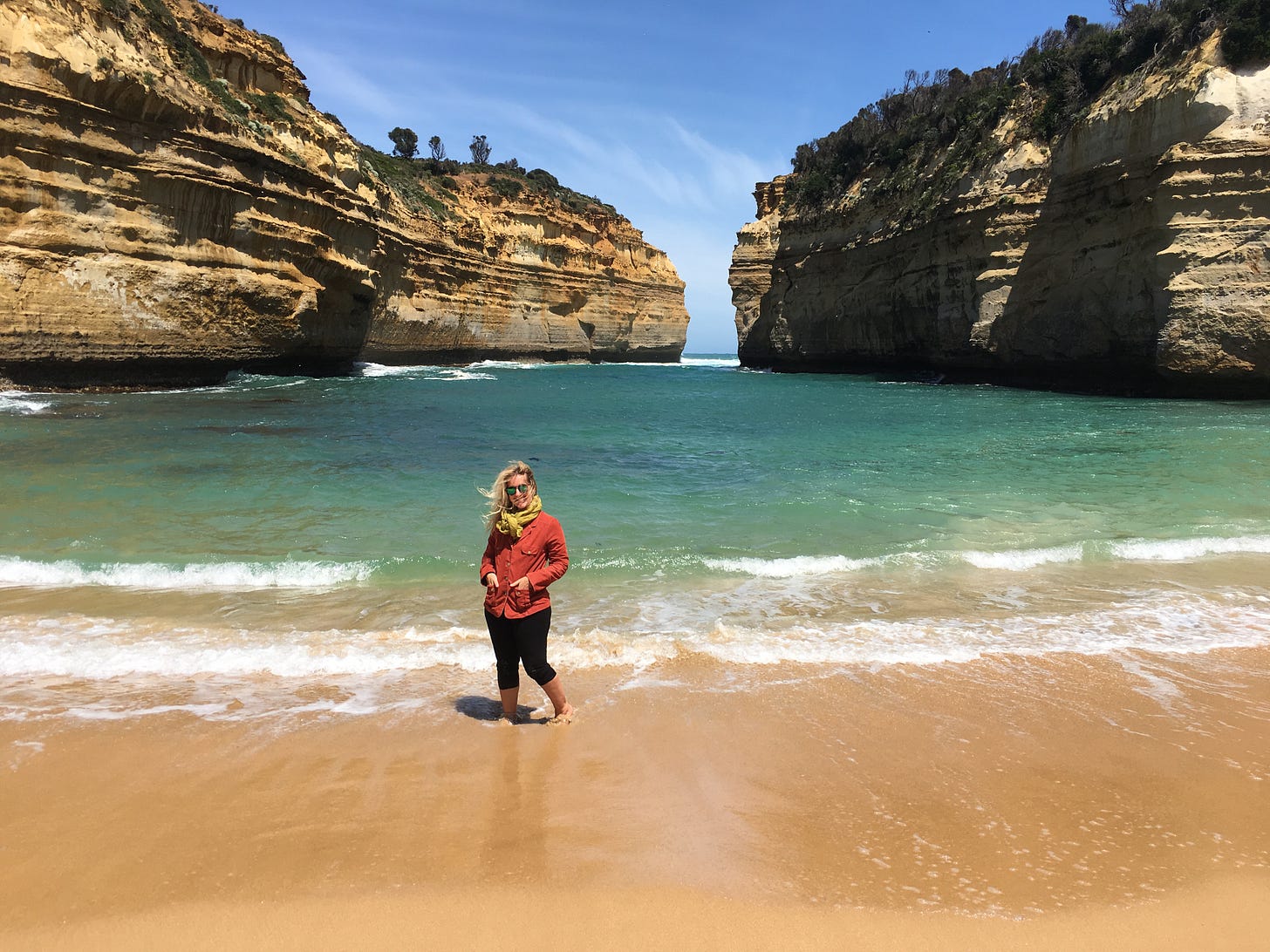A few weeks ago, someone at my Monday night dance class asked me what I did for a living and I blurted out “I teach,” because I had already clocked 8,000 steps that day moving around a classroom and a small campus. Dance class hadn’t yet started but I could feel my day throbbing in my feet.
And then I quickly said, “I’m a writer, too,” as if clarification was needed, which it wasn’t to anyone but me.
Writers don’t typically get 8,000 unplanned steps a day by 4 p.m.
About a month ago, I began a long-term substitute teaching assignment where I guide students through a writing project; many are first-generation English speakers in their households. To help them understand dialogue, I recently performed different verbs. I edit their papers. And sometimes we get to sit together, not write a word and make paper marigolds. A paycheck appears like clockwork every two weeks, and someone else now pays for my health insurance. As a teacher, it’s okay to not be 25 and obsessed with social media. In fact, experience is valued. Gray hair is acceptable.

Years ago, when I didn’t have gray hair, I was told I would make a good teacher, that I had a passionate way of speaking. I was in my twenties and brushed off this compliment. Back then, I didn’t want to be confined to a classroom. I wanted to write, travel, “be in the field,” as I told anyone and everyone, and that’s what I did. I became a stringer for Newsweek, not the website but the actual printed magazine that appeared on newsstands. This opportunity landed in my lap one day when a copy editor at the dot-com job where I worked in downtown Seattle overheard me pitch a story, took me aside and said, “You have a good eye. I know the west coast editor for Newsweek and she needs a stringer.”
I was 26. Newsweek sent me “in the field,” exactly where I wanted to be. I would work my 9-to-5 dot-com job as a staff writer and then go wherever Newsweek wanted me to go, covering whatever they needed covering. One of my most “in-the-field” moments came in late 1999 during the World Trade Organization protests that shut down Seattle as people took the streets over global trade. “The Battle of Seattle,” as it was known. An estimated 40,000 protesters filled downtown. The New York desk and my west coast editor gave no specific direction other than to walk around, take copious notes, and report back everything I saw, which I did. I chronicled the event and walked past the front window of my bank, Washington Mutual, which had been smashed to pieces. I lived 10 minutes from the protests.
I stepped over broken glass and trash, maneuvered between protestors, avoided rubber bullets, and interviewed people about their motivation to get quotes. The weather was cold and the tension was hot. The governor called in the National Guard. I wrote down everything I could and submitted it to the New York desk. My coverage was used, and I received a contributing tagline to Newsweek’s WTO multi-page story. Next month marks the 25th anniversary of The Battle of Seattle.
I’m 51 now. I probably would go back out in the field if a magazine asked me to (several magazines I’ve written for have since folded though happy to see Newsweek still going). There’s a thrill to it. I loved it. It is a privilege to witness life being lived in real time, the possibility and the turmoil, the push for change, advocacy in motion. Now that I’ve got 20 years of motherhood under my belt, shaping young minds feels equally thrilling. Teaching is also advocacy in motion. I would not have been this kind of teacher at age 26. I needed to attend protests and hear the crunch of broken bank windows under my shoes. I needed to be in the thick of the action, if only briefly, to experience as much of the world as possible.
Fast forward almost twenty years, and I’m back on the west coast, a new resident to L.A. A month after unpacking boxes in a new apartment, I signed up to volunteer at the Los Angeles Mission located in downtown’s Skid Row, and I chose to work in the kitchen chopping vegetables and preparing lunch for women who were recently homeless or out of prison and in the Mission’s recovery program.

On my first day, I was slicing onions and carrots and the only other person in the kitchen—a petite woman with long dark hair and many tattoos—asked me how long I had been out of prison. Not if I had spent time in prison, but how long. I paused and felt law-abidingly boring. I told her I hadn’t been in prison, that I was a writer new to L.A. and this was my first day as a volunteer. The conversation didn’t go much farther, but when the head cook there, a rotund man named Carlos (who later died when COVID first swept through in early 2020) learned that I was a writer, he took me aside. “You could help the ladies,” he said. “Help them with their trauma. Teach them how to write about their trauma. The journaling, it helps.”
I was moved by his empathy for these women that he cooked for. I could tell he knew their stories.
I’ll never forget that day, or Carlos. He had the best immigrant story I ever heard. In that cramped kitchen, on another day prepping another lunch, he told me, “I was born in Mexico City, and then one day, my parents said we were going to Disneyland, and we never left!” and he would laugh a full minute about this. I miss him.
Carlos is the reason I became a teacher. This isn’t hyperbole. After his suggestion, I submitted a proposal to the Mission leadership about a creative writing workshop, how it would be structured, what would be taught, my experience as a writer. I had zero teaching experience at the time. My proposal was accepted. The administration seemed excited. In January 2019, I launched a monthly creative writing workshop for the women, helping them write poetry and journal their ideas and experiences, as Carlos had suggested.
The workshop became so popular, the administration asked me to teach the same class to the men, bulky ex-cons who had served prison sentences along with waifish, pallid men who were pulled from the streets and now in the Mission’s detox program. I read them poetry and taught them the same writing prompts that I had shared with the women. The men would read their poems and cry. The women would read their poems and get angry. The men wrote about broken hearts, the loneliness of addiction, missing their children, longing for home. The women wrote about broken hearts, the loneliness of addiction, missing their children, longing for home.
My writing class became this safe space for self expression. Several students allowed me to keep their poems. I taught at the Los Angeles Mission until October 2022, when I then left for Asia and to finish a novel. I sometimes missed the classroom environment, seeing students get excited about ideas and their writing.
The energies to teach and write could not be more different. Teaching is outward engagement. Writing is solitary, as inward as one can get. I am an extroverted writer, apparently a rarity I’ve learned at all the writing workshops and conferences I’ve attended over the years. Most writers prefer to be left alone, yet I’m okay recharging alone and okay recharging among diverse groups of people. There might be maybe five or six extroverted writers out there, we’re not a big bunch. Perhaps there’s a Facebook group, but I wouldn’t know since I am not on Facebook. Nevertheless, I am an in-person people-person who sometimes needs to be alone in her head, so teaching and writing strike this balance.
Every industry weathers challenges and changes, including teaching, however in my 28-year career as a writer, I have witnessed the various publishing industries nearly self-destruct several times over, print nearly disappearing as the Internet revolutionized our lives, authors suing OpenAI over copyright infringement. Writing can be a punitive environment, the goal line always moving, the technology rapidly evolving. AI programs are fed literature, not abstracts. A recent New York Times article reported how AI can write decent poetry but still struggles with math, something I apparently have in common with our expanding artificial intelligence.
In 1996 when I began writing professionally, a master’s degree in journalism didn’t matter; what mattered was having a portfolio of clips, which I have. Now, no one really cares about a portfolio, they want to know how many followers you have. To teach journalism at a community college, you don’t need a portfolio, you need a master’s degree. My first paid writing job was at a small daily newspaper in New Hampshire. The Digital Age wiped out many local newspapers and completely changed how we define “news.” Between 2005 and 2020, two thousand newspapers closed. Not surprisingly, more people get their information off social media.
Last year, I regularly participated in the Writers Guild of America strike, more commonly known as the “Hollywood Strike” or the “Netflix Strike” because writers were fighting against the current streaming model that had devalued their work. I wore a blue WGA shirt and picketed. What followed after the strike turned out to be one of the biggest contractions in showbiz, with fewer shows being greenlit, and established screenwriters struggling alongside newbies.
I needed to be in these tumultuous spaces before going through the requirements of getting approved by the State of California to become a substitute teacher in public schools. Eventually I will earn single subject credentials. I went out into the world, and now feel ready and excited to share what I’ve learned with a roomful of middle and high schoolers, some who seem interested in what I have to say.
Careers require flexibility. Like anything in life, being nimble means not breaking when shit hits the fan or an industry you love hits a rust belt stretch. Nothing about my career has been a straight line. At times it’s been exciting, like reporting from the frontlines of the WTO protests. At times my writing career has been glamorous, like the press trip I was invited to in 2017, where I spent 10 stunning all-expenses-paid days going all over Australia, eating a five-star pressed wallaby dish one night, followed by a sunrise camel ride in the desert, followed by a hike and a helicopter ride to view The Twelve Apostles along the Southern Coast, followed by many other amazing globetrotting experiences. At other times my writing career has been discouraging, like months of no freelance work or invoices being lost in editors’ inboxes or checks disappearing in the mail. And at times, it’s been simultaneously boring and interesting, like sitting through multiple U.S. Senate hearings covering tortoise momentum Capitol Hill legislation when I lived in Washington, D.C.

My writing career didn’t provide predictability, but it wasn’t dull and I regret none of it. This is the beginning of my teaching career, I hope, and so far, whether it’s with the formerly incarcerated or a roomful of tweens or teens, the level of engagement has been a genuine thrill. I’m asked all kinds of questions. A kid asked me about snow because L.A. kids don’t know real, brutally cold, roadblocking snow. Another kid asked me about 9/11. A woman who had spent a fair amount of time in prison asked me about haiku structure. A 24-year-old homeless man who wrote poems in his tent and who struggled with addiction asked me to read his notebook. He wanted to know if I thought his poems were “any good.” They weren’t just good, they were brilliant. He had talent. I never saw him again.
Writing and teaching are both advocacy, but I value serving others more now at middle age than as a young adult so eager to go everywhere and see everything. Chasing the dream involves supporting others in their efforts to succeed, whether it’s students having a light bulb moment or fellow writers signing with a publisher. I am a firm believer that we all win when we all win. I want to win as much as I want you to win. My journey to the classroom may be unconventional, another “late bloomer” moment, but I arrived when I needed to arrive. I got paid to explain Maya Angelou’s repetition in “And Still I Rise.” I got paid to explain the placement of conflict in story structure. I got paid to cut paper marigolds. Last week, a student left an apple on my desk next to one of the marigolds, and that’s when I knew I was exactly where I needed to be.
P.S. The members of Fleet Foxes were in middle school when I lived in Seattle covering the WTO protests, and now I can’t even get tickets to their upcoming show. Still. I can’t gush enough about the intelligence and insight in Robin Pecknold’s lyrics, a 2022 The New Yorker article citing this band’s “Whitmanesque impulses,” high praise for any indie folk band. Pecknold (who almost shares a birthday with me!) is doing a solo show this December at The Lodge here in L.A., and already both nights are sold out. The City of Angels knows how to put on a show, and really knows how to do live music. I have not experienced enough of this yet, and will readily snatch up Pecknold tickets if any become available. Concerts are expensive, but wow, they’re fun! There’s no other energy like dozens or hundreds or thousands of strangers sharing space and enjoying the same song together. I saw Greta Van Fleet perform at The Greek Theatre in 2021 and at The Forum in 2023, and still need to get to The Wiltern. The Lodge is also top of my list in case any Pecknold tickets suddenly become available.
I’ve had Fleet Foxes’ song Mykonos on repeat. There’s a gossamer quality to this song that few can pull off as masterfully as Pecknold. It’s haunting. It’s beautiful. It’s got drive and at the same time, it’s delicate. There is a simultaneous gratitude for and acknowledgement of the pain of memory. This song somehow achieves a remarkable balance of every complicated feeling you could ever have without losing its structure and succumbing to cliche. Pecknold’s songwriting is pure poetry. The same could be said for another favorite, Tiger Mountain Peasant Song, part confession, part prayer, part plea, part wish; another example of a deceptively complicated series of notes and words achieving multiple things at once. Whatever your musical leanings, if you’re not yet a Fleet Foxes fan, become one. Their music is thoughtful, and thoughtful is refreshing.




Hear, hear, Carlos! A wonderful post! It will resonate with so many. *Applause!*
Love this! I recently left full-time classroom teaching. While it was totally the right move for me and my family, I do miss teaching. Good to know there are options out there!